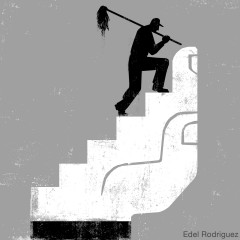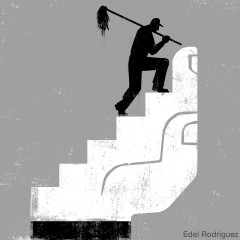 “Where are the Democrats on the minimum wage? Where’s Pelosi? Where’s George Miller? Where’s Trumka?” Ralph Nader asked me. It was a rhetorical question, another reminder from Nader that Democrats have gone missing on issues the party once owned. As have the institutions that extend the party’s reach; AFL-CIO president Richard Trumka isn’t exactly leading on the minimum wage.
“Where are the Democrats on the minimum wage? Where’s Pelosi? Where’s George Miller? Where’s Trumka?” Ralph Nader asked me. It was a rhetorical question, another reminder from Nader that Democrats have gone missing on issues the party once owned. As have the institutions that extend the party’s reach; AFL-CIO president Richard Trumka isn’t exactly leading on the minimum wage.
Nader believes that Minority Leader Nancy Pelosi and California Congressman George Miller do not want to get entangled in a minimum wage increase. For one thing, they have to raise money from corporate underwriters of the Democratic Party who oppose increasing the minimum wage. And from corporate donors who give to Democrats and Republicans alike.
“The nonprofits and the labor unions are waiting on a signal from a senior legislator, Rep. George Miller,” Nader wrote on Nader.org in early June.
Minority Leader Nancy Pelosi and the House Democratic Caucus are also waiting for Miller, who has not introduced a bill increasing the minimum wage since Obama took office (the Fair Minimum Wage Act of 2007 was the last, with increases to $7.25 ending in July 2009). Of course, in turn, Obama is waiting on the Democratic leadership in Congress who, though firmly behind the increase, is waiting on Obama and, of course, Miller, who hails not from Dallas, Texas, but from the progressive San Francisco Bay area of California.
Miller is the ranking member of the House Education and Workforce Committee and chairman of the House Democratic Policy Committee, and he has Pelosi’s ear. Absent his leadership, a minimum wage increase is being promoted by the small Democratic wing of the Democratic Party.
Illinois Congressman Jesse Jackson Jr. introduced a bill that would increase the minimum wage from the current $7.25 an hour to $10. “We’ve bailed out banks, we’ve bailed out corporations, we’ve bailed out Wall Street,” Jackson said at a press conference when McDonald’s, and Home Depot will on the taxpayer. he introduced his bill. “Now it’s time to bail out working people who work hard every day and they still only make $7.25.”
Jackson is right on the issue, yet his logic is flawed.
The bailouts of the banks and the auto industry were transfer payments: public dollars funding private enterprises. A minimum wage increase is paid for by the private sector. Walmart, McDonald’s, and Home Depot will pick up the tab, with no burden on the taxpayer.
Wage increases are “stealth stimulus,” a term I’m borrowing from labor economist Kai Filion.
While he was at the Economic Policy Institute, Filion studied the broader effect of minimum wage increases, which could be tracked with precision because the last minimum wage bill, passed in 2007, raised wages in three increments. The first two increases generated an estimated $4.9 billion in spending by July 2009. The final increase in July 2009 increased total spending by $5.5 billion.
There is economic logic in these numbers.
At $7.25, a full-time minimum wage worker earns $15,800 a year, about $4,100 above the federal definition of poverty for a single individual, which is $11,702. If that single individual is supporting a family of four, her family is living at 66 percent of the poverty level. When you make $7.25 an hour, all your income is disposable income, which is spent as fast (if not faster) as you earn it.
Add $2.75 to that and every cent becomes economic stimulus.
Filion included one additional calculation in his minimum wage study.
“The increase to $9.50 by 2011 that President Obama promised during the campaign,” Filion wrote, “would generate an estimated $60 billion spending over a two-year period.”
“The increase President Obama promised” never materialized.
Which is bewildering.
Alan Krueger, who chairs Obama’s Council of Economic Advisers, is a labor economist who has written exten sively on the minimum wage. He has held the job for almost a year and is Tim Geithner’s tennis partner, which must get him facetime privileges with the President.
Polling by James Zogby in June found that 70 percent of Americans would support a minimum wage increase to $10.38, where it would be if it were indexed to inflation going back to 1968. And while Obama is losing some of the youth vote that elected him in 2008, 71 percent of what Zogby refers to as the first Global Generation, those between 18 and 23, support a minimum wage increase. Which is logical because they are being paid minimum wage.
Thirty million Americans currently struggle to get by on minimum wage salaries. Some of them will vote in the next election. The minimum wage represents the intersection of good policy and good politics.
Romney, predictably, was for an increased minimum wage before he was against it. When he ran for governor of Massachusetts in 2002, he supported minimum wage increases. Currently, he is hiding behind an elaborate indexing that is pegged to 1990. “Yeah, so that would tell you that right now there’s probably not a need to raise the minimum wage,” Romney told CNBC’s Larry Kudlow in March. “What I can tell you is had one indexed the minimum wage back to, let’s say, 1990, the minimum wage would be lower than it actually is.”
The “let’s say” dependent clause is critical here.
The New Republic’s Timothy Noah suggests that Romney selected 1990 because that was the low point for the minimum wage, after nine years of Republican political dominance. His index begins at the bottom.
Speaking to Kudlow, Romney described a formula that was more elaborate than the 1990 index that justified lowering the minimum wage. “Democrats make big hay of this every few years. ‘Oh, we are going to have to raise the minimum wage.’… Frankly, the right way to process it is to look at the minimum wage, look at how unemployment rates are, make adjustments as time goes on based on our need to compete, the need of the job market, and of course what’s happened to inflation.” (Find a labor economist who can calculate a wage scale based on that string of variables.)
And “big hay”?
Here is a candidate for the presidency making the case for an index that would actually reduce the minimum wage to $6.68, after taking a $77,000 tax deduction for one dressage horse. By my rough calculation, Rafalca, the Romneys’ horse, scrapes by on four minimum wage salaries.
At least Obama was for a minimum wage before he was indifferent to it (and doesn’t take a personal tax deduction for a horse).
In 2007, then–Senator Obama told the Take Back America Conference:
“It’s time to turn the page for all those Americans who want nothing more than to have a job that can pay the bills and raise a family. Let’s finally make the minimum wage a living wage.”
Obama later promised to increase the minimum wage to $9.50. Yet he and the Democrats on the Hill have ignored the issue for three and a half years.
Jackson got only 17 members of the Democratic Congress to sign on to his minimum wage bill.
For the record, they are: Karen Bass (CA), Emanuel Cleaver (MO), John Conyers (MI), Marcia Fudge (OH), Alcee Hastings (FL), Michael Honda (CA), Sheila Jackson Lee (TX), Barbara Lee (CA), John Lewis (CA), Gwen Moore (WI), Eleanor Holmes Nor- ton (DC), Lucille Roybal-Allard (CA), Bobby Rush (IL), Janice Schakowsky (IL), Edolphus Towns (NY), and Maxine Waters (CA).
If cynics observe that this is not a list of legislators who make legislation happen, that doesn’t mean they aren’t right. And two weeks after Jackson and Nader’s press conference, it was reported that Miller is preparing a more modest proposal that would incrementally increase the minimum wage to $9.80 by 2014.
A final word regarding the Romneys’ horse.
Emiliano Zapata quit his job as a peasant and became a revolutionary when he was assigned to his hacendado‘s stable and saw that the horses he was feeding lived better than he did.
Related reading: Minimum Wage and the Court




0 Comments